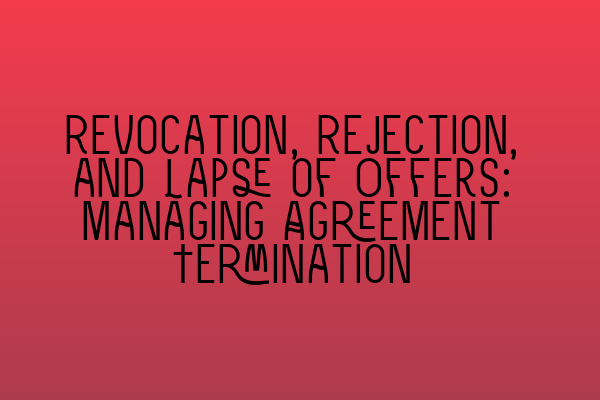Revocation, Rejection, and Lapse of Offers: Managing Agreement Termination
In the realm of contract law, parties often engage in negotiations and make offers in order to reach an agreement. However, not every offer results in a binding contract. Sometimes, offers are revoked, rejected, or allowed to lapse. Understanding the legal implications of these actions is crucial to effectively manage agreement termination. In this article, we will explore the concepts of revocation, rejection, and lapse of offers, and how they impact the formation and termination of contracts.
Revocation of Offers
When one party makes an offer, they generally have the right to revoke that offer at any time before it is accepted. However, there are certain exceptions to this general rule. For example, if the offeror has promised to keep the offer open for a specified period of time, they are legally bound by that promise and cannot revoke the offer within that time frame. Additionally, if the offeree has given consideration in exchange for the offer to remain open, it becomes irrevocable. Consideration refers to something of value that is exchanged between the parties, such as money or a promise to perform an act.
It’s essential to note that revocation of an offer must be communicated to the offeree for it to be effective. Mere contemplation or an internal decision by the offeror to revoke the offer without conveying it to the offeree does not terminate the offer. Communication is key in revoking an offer, and it is advisable to do so explicitly and promptly to avoid any misunderstanding or potential legal disputes.
Rejection of Offers
On the other side of the negotiation table, the offeree has the right to reject an offer. Rejection can be communicated in various forms, such as a clear statement of refusal or by proposing new terms that constitute a counteroffer. It is important to understand that a rejection terminates the original offer, and the offeror is under no obligation to revive or reconsider it. Therefore, careful consideration should be given before rejecting an offer, as it may result in the loss of a potentially favorable agreement.
Lapse of Offers
Offers can also lapse due to the passage of time or the occurrence of a specified event. If an offer includes a deadline for acceptance, it will automatically terminate if the offeree does not accept within that timeframe. Similarly, if the offer is contingent on a particular event and that event does not occur within a reasonable time, the offer will lapse. It is crucial for all parties involved in negotiations to be aware of any time limitations or conditions attached to the offer to avoid unintended lapses.
Managing Agreement Termination
To effectively manage agreement termination, parties should adhere to the following best practices:
1. Clear Communication:
– Properly convey the revocation of an offer to the offeree.
– Communicate a rejection in a clear and unambiguous manner.
– Ensure all parties understand the terms and conditions of the offer to avoid any lapses.
2. Document the Process:
– Maintain a record of all communications and negotiations for future reference.
– Keep track of any agreed-upon deadlines or conditions.
3. Seek Legal Advice:
– Engage the services of a qualified solicitor to provide legal guidance throughout the negotiation process.
– Seek legal advice if you are uncertain about the implications of revocation, rejection, or lapse of an offer.
Understanding the concepts of revocation, rejection, and lapse of offers is essential for parties involved in contract negotiations. By having a clear understanding of these principles, you can effectively manage agreement termination and protect your rights and interests.
For further assistance in preparing for your SQE exams, be sure to check out the following related articles:
1. SQE Sample Papers: Practice for Exam Success
2. Adjusting Your SQE Strategy Based on Mock Performance
3. Peer Discussions Post-Mock: Learning from Collaboration and Feedback
4. Interactive Mock Tests for a Realistic SQE Experience
5. Adjusting Strategy Based on Mock Performance: Improving Your Approach
Remember, staying informed and continuously improving your understanding of contract law principles is key to success in your legal career. Stay proactive, seek knowledge, and strive for excellence.
